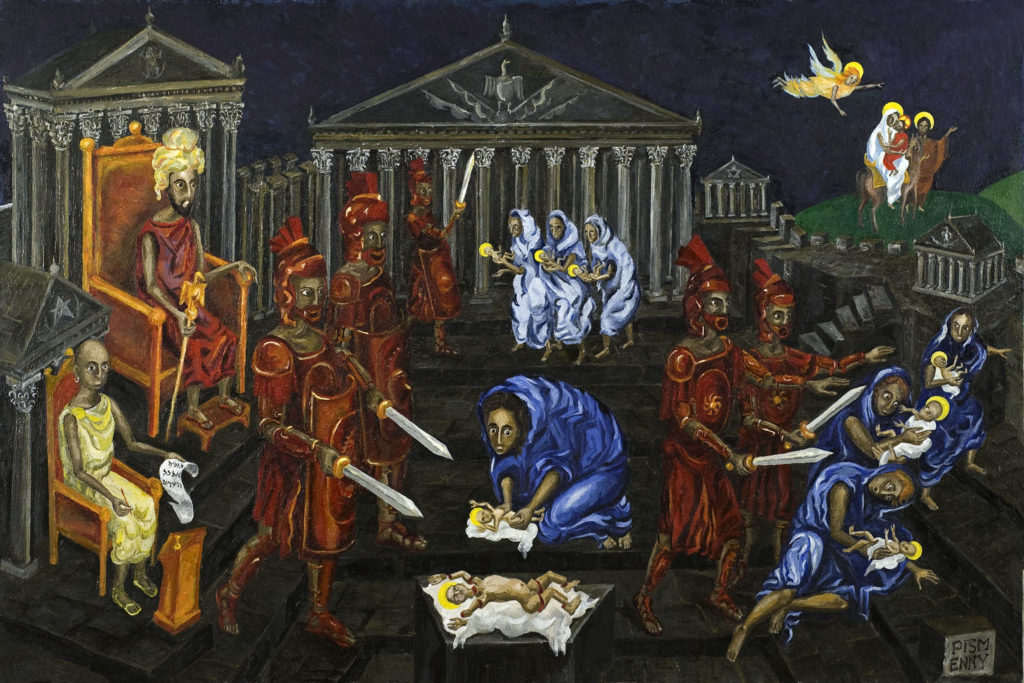Jesus, Son of Herod
We know the story told by Matthew that Herod, the Roman-appointed king of the Jews, received the Persian Magi looking for the child born to be king of the Jews. Recall Herod’s response to the news of a rival king after the magi excluded him from whatever they learned about Jesus’ location: slaughter all children in the area around Bethlehem two years old and under.
Herod’s wicked response is one way fearful sovereigns have dealt with rivals.
But imagine with me a different story.
From Herod’s personal journal:
A few days ago, I received a visit from a group of Persian astrologers asking where the king of the Jews was to be born, for they had seen a star which they interpreted as his rising star. Ugh. Like some child born to any Jew would be given the same “star in the heavens” honor bestowed on the Emperors. Nevertheless, one can’t be too careful, especially given the history of even emperors being slain by their rivals. I asked the magi to return to me after they had located the child. Of course, I did not trust them to return. So, several loyal spies trailed them. My men immediately returned to me with the news, while the wily magi disappeared.
I wasted no time—for who knows if the visit of these strangers might have aroused suspicions in Bethlehem or in the child’s house. I called for a royal retinue to assemble, as resplendent and impressive as anyone had seen. Make sure my wealth and power were on display. Shock and awe.
As soon as the company was assembled, we traveled to Bethlehem, led and followed by my guards and a few off-duty Roman centurions.
We created the stir in the village for which I hoped, right up to the child’s house. At the home, the door was already open, and a man, his wife, and a small boy stood in the doorway, eyes as big as large shekels. My servants announced me. Then I stepped forward and proclaimed the following:
“I am Herod, your king. I have been informed that a very special child resides in this house, Jesus, son of Mary and Joseph. I’ve been told that this boy Jesus is destined by Adonai to be king of the Jews. Well, I am not sure how that would happen, given that kingship is granted by the Empire. But, I am prepared to play my part in this mysterious story. I come to say I am here to adopt this child. I will raise him in the palace as my own son. He will learn all that is necessary to become a wise and just king. Looking at your surroundings, it is clear that I can offer him a life exponentially better than you can afford him.”
What could those peasants do? They turned over their son to me. I took Jesus back to my palace, and here he will live out his days.
Keep your friends close and your enemies—and rivals—closer. In my household, I will keep an eye on him and I can ensure he learns the values and skills necessary for one who serves at the pleasure of an occupying force. He will learn that:
Happy are we who are wealthy.
Happy are we who can avoid ever being hungry.
Happy are we who rule and are, therefore, above the law.
Happy are we to whom others are indebted.
Happy are we who tell the stories about who and what to fear.
Happy are we who use violence to establish peace and order.
Happy are we who are feared.
Then, if Jesus should ever reign (as unlikely as that prospect is), he will know how a king must think and act.
Can you imagine what would have happened if Jesus had been allowed to believe he was a prophet-king? The prophets in our scriptures often opposed their kings. They called out what they saw as injustices, especially the actions of leaders and the way the rich treated the poor. Prophets were disrupters.
No, the Romans would not tolerate subversion and neither can I. Better that religion serve the king and provide a canopy of sacred protection for what I do. The king needs religion to buttress his actions and to maintain good order. No king needs a prophet shooting off his mouth and fomenting resentment regarding how the rich treat the poor.
So, I have adopted this child. Threat neutralized.
End of journal entry.
IMAGE: Massacre of the Holy Innocents, oil on canvas, 36″ x 24″ (91 cm x 61 cm)
2008, Private Collection; Museum quality reduced size giclee prints on canvas available. Inquire
Dr. Gary Peluso-Verdend is president emeritus at Phillips Theological Seminary and is the executive director of the seminary’s Center for Religion in Public Life. The opinions expressed in this blog are those of the author. Learn more about the Center’s work here and about Gary here.



Comments are closed.